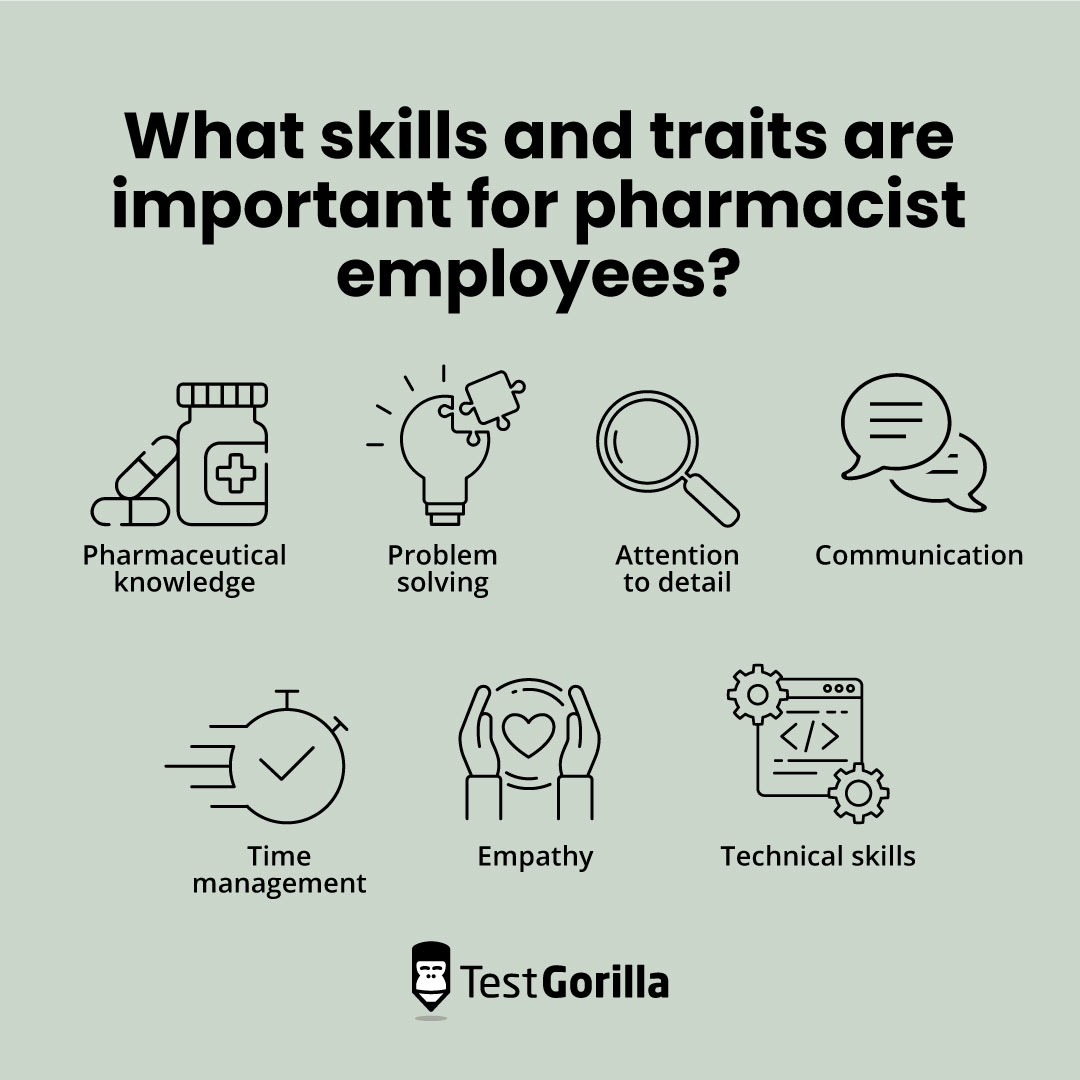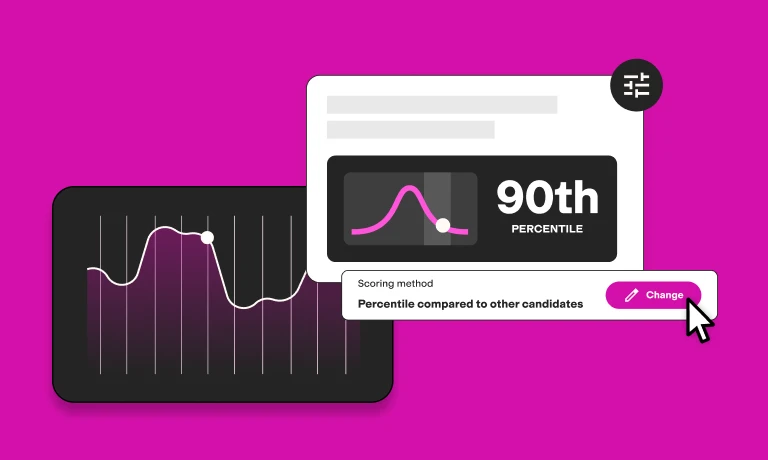Pharmacists are an integral part of the healthcare system. They dispense medications, review prescriptions, establish drug interactions, educate patients about health and well-being, and more.
Besides being well-versed in medicine and its influence on the human body, good pharmacists dedicate themselves to delivering high-quality patient care. Pharmacy is a science requiring responsible and knowledgeable individuals. It’s vital that only professionals who possess the relevant communication and medical-related skills enter this role because small mistakes in this sector can result in dire consequences.
With TestGorilla, you can easily evaluate these skills and hire the most suitable candidate. For more information, this guide shares how to examine pharmacist skills effectively to inform your decision on your quest to find the most eligible candidate.
Table of contents
What is a pharmacist skills assessment?
A pharmacist skills assessment is an evaluation process using several skills tests designed to determine the suitability of candidates for a pharmacist position. It ensures you hire a pharmacist with the skills and education necessary, such as critical thinking, problem solving, and medical knowledge, to perform their job effectively and in line with safety standards.
A pharmacist skills assessment typically includes several questions in each test that gauge a candidate’s pharmaceutical knowledge, ability to manage medications, familiarity with pharmacy regulations, ethical considerations, and best practices to ensure patient safety.
You can also incorporate skills tests after you have sourced candidates to assess their ability to communicate effectively with others and solve complex workplace problems, including to:
Advise patients about medications for specific conditions
Provide extra services such as cholesterol management support
Identify possible drug interactions when a doctor has prescribed more than one medication to a patient
Why are pharmacist skills important?
As members of the healthcare system, it’s vital to hire competent pharmacists to deliver the best possible service to patients. With responsibilities that can directly influence health outcomes, it’s crucial that pharmacists have the right skill set.
Below are some of the most important reasons to employ pharmacists with the proper skill set and why these skills are important for the healthcare industry.
Patient safety
Pharmacists must possess the skills and knowledge to ensure the safety of all patients they deal with. Since pharmacists work directly with the public, they carry a lot of responsibility in dispensing medications correctly and delivering accurate guidance to patients. They have a powerful influence on people because many rely on their expertise and trust their recommendations.
Pharmacist skills, such as medication quality and legal knowledge related to drugs, help keep people safe by providing accurate medications and informing patients how to use them correctly. This duty ensures quality patient care outcomes since people acquire the treatment they need to manage, alleviate, or cure health problems, from minor ailments to chronic diseases.
To provide this information, a pharmacist requires substantial knowledge of the following areas:
Allergies
Side effects
Drug interactions
Contraindications
With this knowledge, pharmacists can ensure patients don't take the wrong drug, overdose, take dangerous combinations, or experience adverse symptoms.
Medication handling
Handling medication is a substantial part of the job description for a pharmacist. The ideal candidate for a pharmacist position is an expert in medication management. They can give patients the corre ct medication to counter various ailments and are fully aware of drug doses, half-life, and classes of medications.
A pharmacist competency assessment is an excellent way to evaluate a candidate's knowledge of drugs and ability to interpret prescriptions, determine dosages, and communicate clearly with patients and other healthcare providers. It provides statistical results related to each of these skills to demonstrate each candidate’s proficiency.
Patient counseling
Pharmacists are educators in a prime position to share their expertise with the public. They converse face-to-face with people from all walks of life, and a good pharmacist can communicate with any individual they encounter. They can use their drug education and health knowledge to advise others, and specific communication strategies and skills assist them with this, including:
Verbal communication via telephone with patients
Written communication when processing prescriptions
Active listening to fully understand a patient’s specific requests
Skilled pharmacists provide valuable information to patients and can answer any questions regarding medications, such as how a particular medication works, the best time to take it, and whether there are any precautions to consider. Patients must understand this information to manage their health effectively, as they are more likely to maintain a treatment program if they adhere to medication regimens.
Medication adherence
Sometimes barriers keep patients from adhering to medication schedules. Accessibility, cost, fear, forgetfulness, and misunderstanding are common factors that hinder a person’s treatment plan.
Adherence to therapies is key to success, while non-adherence can diminish health outcomes, worsen disease, or even lead to death. For reference, the American Medical Association states that a patient is adherent if they take 80% of their prescription medicine.
A pharmacist can use their skills and traits to address the problem and find a method to improve compliance and health outcomes. For example, pharmacists might use their communication skills to explain complex medical jargon to patients in a way they can understand. Patients can then go home with clarity on how to take their medication.
Disease prevention
Pharmacists often contribute to disease prevention alongside doctors, scientists, and other healthcare teams. Using drugs to control diseases and participating in public health interventions such as immunization programs are some actions pharmacists take that stop the spread of disease and protect patients from ailments.
A pharmacist can offer advice and services to minimize disease risk through lifestyle interventions. For instance, they can support people in quitting smoking or managing stress and offer tailored advice on general health topics like nutrition and exercise.
The best insights on HR and recruitment, delivered to your inbox.
Biweekly updates. No spam. Unsubscribe any time.
What skills and traits are important for pharmacist employees?
Pharmacists must possess hard and soft skills to do their jobs. Here are some of the most important skills to consider when interviewing job applicants or reviewing a pharmacist competency assessment:
Pharmaceutical knowledge
Your pharmacists should show a solid understanding of pharmaceutical science, including drugs, interactions, dosages, and the latest developments in the field. After all, pharmacists are experts in medicine.
Mathematics and science should also form their skill set because these subjects apply to the role’s everyday tasks. For example, chemistry is necessary to understand drug composition, biology covers the effects of drugs on human health, and mathematical ability is important when dispensing and compounding dosages. As stated by the National Center for Biotechnology Information, this knowledge ensures pharmacists can:
Measure drug doses
Calculate drug quantities
Calculate drug concentrations
Problem solving
Pharmacists capable of taking initiative and finding methods to handle problems are valuable. Pharmacists face complex issues that demand resolution to ensure patient safety in daily practice. From pinpointing possible drug interactions to sourcing alternatives when medication is unavailable, a pharmacist must be able to make informed decisions in a high-pressure environment.
Without strong problem-solving skills, a pharmacist will struggle to navigate various situations that arise throughout a shift. In turn, your patients may receive a lower level of care than they need.
Attention to detail
Attention to detail is a requisite for pharmacists. Handling pharmaceuticals requires high accuracy and precision to dispense the correct medications, ensuring patient safety and mitigating harm. Since pharmacists must continuously read prescriptions and doctors’ notes, it’s essential that your candidates can show an ability to check details, leaving no room for errors.
Communication
Excellent communication skills enable pharmacists to interact easily with patients and other medical professionals. Patients rely on pharmacists to give the correct instructions to use medication, including guidance on precautions and side effects to watch out for.
Instructing, explaining, and conversing with community members is a must because it means people comply with their treatment plans, address concerns, and seek emergency assistance if allergic reactions or other severe symptoms occur.
Remember, your chosen pharmacist becomes a representative of your pharmacy, so they must be able to communicate with patients effectively. With expert communication skills, a pharmacist can enhance the reputation of your business and satisfy patients, which can lead to a better patient-business relationship.
Time management
In typically high-pressure and fast-paced environments, pharmacists must juggle various tasks while meeting patients' needs at all times. Because time pressures, frequent interruptions, and multitasking limit a pharmacist’s daily duties, time management becomes critical for workplace success.
Empathy
Look for candidates with empathy and empathy sub-skills such as patience, active listening, and compassion because showing people kindness is central to any career in healthcare.
Patient-centered care is about prioritizing the unique needs of individuals, and empathetic pharmacists can better understand patients and assist them most appropriately. For example, if a patient voices concerns about a new medication, a pharmacist should offer support and guidance to put the patient’s mind at ease.
Technical skills
Everyday pharmacy practice includes tools and technologies, such as computers and software systems, to perform duties. A tech-savvy pharmacist can navigate automated medication dispensing systems, pharmacy management software, electronic health records, and other programs to optimize patient care in modern healthcare settings.
Skills and traits tests
Testing a candidate’s skills and traits as soon as possible during the hiring process means you can find your next pharmacist more quickly. It narrows down the competition, helping you to discover the perfect candidate based on the skills you’re looking for.
Then, use structured interviews to gain further insights into your applicants’ skills and knowledge. Check out our pharmacy technician interview questions for ideas.
TestGorilla has an extensive collection of tests to help you assess pharmacist skills, removing the uncertainty from hiring. Only the most qualified experts craft our tests, and we offer a wide selection to choose from. The following options align with several skills needed to be a skilled pharmacist:
Problem solving test
Our Problem solving test is ideal for determining if candidates can identify problems, find the correct methods to resolve challenges, and make important decisions. For example, if you need to learn if a pharmacist candidate understands when blood pressure management is important and how a pharmacist might take problem-solving steps to determine this, this test can assist you.
Seeing how a candidate performs in this test can reveal how they might execute their problem-solving skills when faced with other complex challenges of working in a pharmacy, such as monitoring pharmaceutical production and sales with drug companies.
Time management test
With our Time Management test, you can see how well a candidate handles their time in the professional world. It covers typical workplace scenarios in which employees must prioritize, plan, execute, reflect, and communicate different tasks.
Communication test
When looking for a good communicator for pharmacy work, the Communication test can help you find them. This test assesses your candidates’ ability to communicate clearly using written and verbal language while maintaining professionalism.
Attention to detail test
Because pharmacists must process large quantities of information throughout the day, the Attention to detail test can help you secure a candidate with this necessary skill. It assesses your candidates’ ability to focus on textual detail, filter information accordingly, and ensure consistency.
Pharmacist skills assessment FAQs
What skills are important for a pharmacist?
Being a pharmacist is a complex career choice that requires hard and soft skills for success. The most crucial pharmacist skills are a solid understanding of pharmaceuticals, technical skills, communication, compassion, and scrupulous attention to detail.
What soft skills do pharmacists need?
Among pharmacists, the most crucial soft skills are communication, problem solving, teamwork, time management, and empathy. These skills are essential given that pharmacists play a major role in the healthcare system, working directly with medication and people, including patients and health professionals.
What are some characteristics of a good pharmacist?
A good pharmacist is empathetic, supportive, and willing to help patients with their questions and concerns. A genuine commitment to delivering the best quality service to all patients is an essential trait of any pharmacist because this will drive them to provide exceptional care.
How TestGorilla can help you find the right skilled pharmacist
Pharmacists are invaluable to health care teams, dispensing medications, offering patient support, and promoting the best health outcomes. Since they have such a consequential role, checking their skills is a requisite of the hiring process.
With TestGorilla’s test library, you can implement the appropriate skills tests to sharpen your recruitment strategies. Creating an assessment with TestGorilla reduces time-to-hire metrics, helps omit unconscious bias when assessing applicants, and removes the need to screen resumes because the skills tests do this for you.
After assessing the testing results, you can narrow your recruiting pool and ultimately refine your decision.
Get started with TestGorilla
Pharmacists can help people live longer, healthier lives with the expert use of medications and health advice, but they must have a particular collection of skills to do so. With TestGorilla, you can get to know your candidates better through specialized tests that measure their skills, personality, and fit for the role.
Browse TestGorilla’s range of expert-crafted tests to target the most valuable skills you want to see in your applicants. Candidates who show strong problem-solving abilities, time management, and attention to detail, for instance, will prove to be a valuable addition to your team.
If you’re ready to implement a more in-depth and efficient screening process, get started with a free TestGorilla plan today. Our assessments have already supported thousands of companies. Join them to enhance your hiring process and business outcomes.
You've scrolled this far
Why not try TestGorilla for free, and see what happens when you put skills first.



















